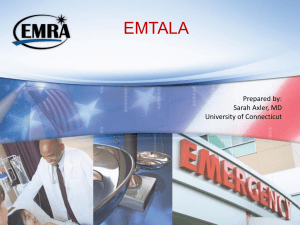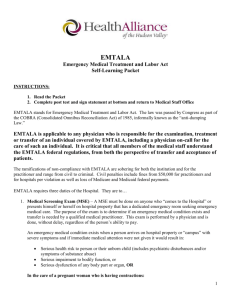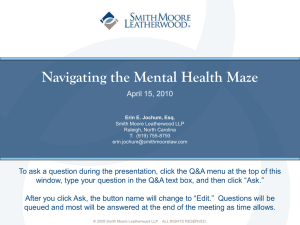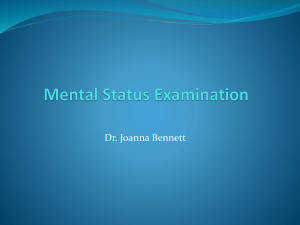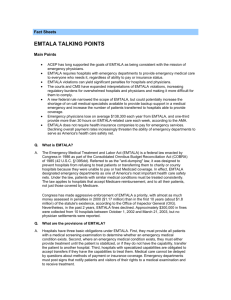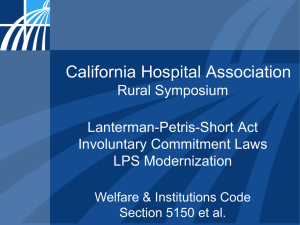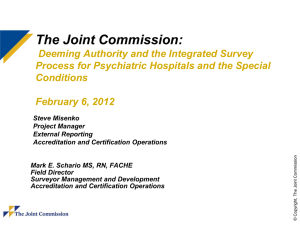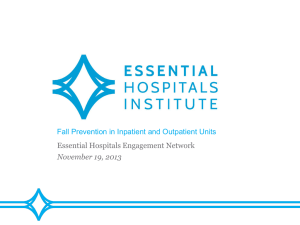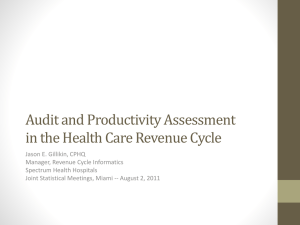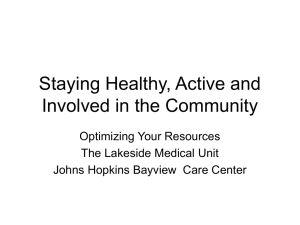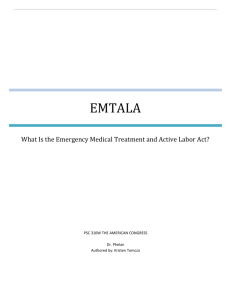Gina Greenwood - Georgia Hospital Association
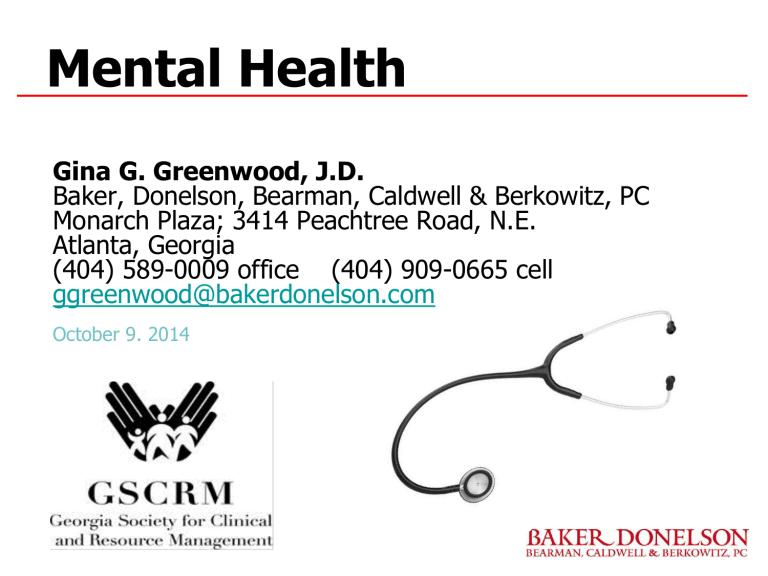
Mental Health
AU
Gina G. Greenwood, J.D.
Baker, Donelson, Bearman, Caldwell & Berkowitz, PC
Monarch Plaza; 3414 Peachtree Road, N.E.
Atlanta, Georgia
(404) 589-0009 office (404) 909-0665 cell ggreenwood@bakerdonelson.com
October 9. 2014
National Focus on
Mental Health and EMTALA
WHY NOW?? Media Coverage of Stories Like --
• Nevada Busing of Psych State Inpatients to California – allegedly 1500 patients over 2-5 years
• Nov. 19, 2013: Virginia State Senator Creigh Deeds was stabbed in head and chest at his home by his 24year-old son, Gus. Gus then shot himself. Although a judge had issued an involuntary commitment order, and despite an intensive search, no available mental health bed could be found to provide treatment before attempted murder/suicide.
• Closure of numerous state hospitals across the country;
New mental health system = jails, streets, EDs
Senator Deeds & His Son on Campaign Trail
Senator Deeds’ Scars Are Deep.
United States Commission of Civil Rights
Briefing – Washington, DC – March 2014
Concern: Extent to which patients with a psychiatric disability are denied adequate care and whether there has been systemic neglect of this group. Focus: EMTALA
• 9 speakers in 3 Panels:
• Government Panel: Marilyn Dahl, CMS; Eileen
Hanrahan, OCR; Sandra Sands, OIG
• Lawyer Panel: Staci Pratt, ACLU; Gina Greenwood,
Baker Donelson; Hernan Vera, Public Counsel; and
Susan Preston, Goodell, DeVries, Leech & Dann
• Academic Panel: Katharine Van Tassel, The
University of Akron School of Law; Richard
Elliot, Mercer School of Medicine and School of Law; a NC ED physician.
• Only 1 ED provider!!!!!
USCCR Briefing on EMTALA – March 2013
7
Common EMTALA Citations
• Failure to screen appropriately by QMP
• Failure to document assessment, risks and stabilization of patient (and fetus)
• Failure to stabilize intoxicated/psych patient
• AMA / LWBS (capacity issues)
• Inappropriate transfer: patient dumping
• Failure to accept transfer because closer hospital available
• On-call physician: failure to consult or accept patient or failure to present
• Ambulance diversion after arrival on site
• Psychiatric Sheriff drops / requests
• Trend – if case originated ED and death occurs –
EMTALA cited.
EMTALA General Rule – Summary
• If an individual comes to the emergency department and a request is made for examination or treatment of a medical condition, then:
• Hospital must provide an appropriate medical screening exam by qualified medical personnel
(QMP) to determine whether an emergency medical condition (EMC) exists.
• In the absence of such request, apply “prudent layperson observer” test.
• If no emergency, EMTALA obligation is over, but other standards apply and remember physician – patient relationship is established.
• If an EMC, then stabilize and/or appropriately transfer (or admit as an inpatient).
• All terms have been expansively defined!!
EMTALA STATUTE – General Rule
(Has Been Expansively Defined by Regs/Guidance)
• In the case of a hospital that has a hospital emergency department, if any individual . . . comes to the emergency department and a request is made on the individual's behalf for examination or treatment for a medical condition, the hospital must provide for an appropriate medical screening examination within the capability of the hospital's emergency department, including ancillary services routinely available to the emergency department, to determine whether or not an emergency medical condition . . . exists.
• If . . . the hospital determines that the individual has an emergency medical condition, the hospital must provide either—
• within the staff and facilities available at the hospital, for such further medical examination and such treatment as may be required to stabilize the medical condition, or
• for transfer of the individual to another medical facility in accordance with [EMTALA transfer requirements].
• See 42 U.S.C. § 1395dd
Medical Screening Examination
• Triage Medical Screening Examination
• “Appropriate” means screening examination:
• is suitable for the symptoms presented and
• conducted in a non-disparate fashion.
• Must assess and reassess (if change in condition)
• Medical records should contain documentation such as: medically indicated screenings, tests, mental status evaluation, impressions, and diagnoses (supported by history & physical exam, labs, and other test results) as appropriate. (per Int. Guidelines)
• For individuals with psychiatric symptoms, medical records should indicate an assessment of suicide or homicide attempt or risk, orientation, or assaultive behavior that indicates danger to self or others. (per Int. Guidelines)
10
• Qualified Medical Personnel must do MSE for BOTH physical and mental health.
11
Emergency Services: Medical Screening Exam
The Hospital must provide for an Appropriate Medical
Screening Examination (MSE) by Qualified Medical
Personnel (QMP) within the capability of the hospital’s emergency department, including ancillary services
routinely available to the emergency department, such as behavioral health services, to determine whether or not an emergency medical condition exists.
Medical Screening Examination (cont.)
• Trend Focus: A MSE is not and isolated event; rather it is an ongoing process.
The patient should be continually monitored according to the patient's needs which must continue until the patient is stabilized or appropriately transferred.
• Any change in condition requires a recertification by the physician that the patient is stable for transfer or release.
• Trend – Every 15 to 30 minutes !
12
Medical Screening Examination (cont.)
• Medical record must reflect continued monitoring according to the individual’s needs until it is determined whether or not the individual has an EMC and, if he/she does, until he/she is stabilized or appropriately transferred. There should be evidence of this ongoing monitoring prior to discharge or transfer.
• MSE must be the same MSE that the hospital would perform on any individual coming to the hospital’s dedicated emergency department with those signs and symptoms, regardless of the individual’s ability to pay for medical care. If a hospital applies in a nondiscriminatory manner (i.e., a different level of care must not exist based on payment status, race, national origin, etc.) a screening process that is reasonably calculated to determine whether an EMC exists, it has met its obligations under EMTALA.
• If the MSE is appropriate and does not reveal an EMC, the hospital has no further obligation under 42 CFR 489.24.
Per Int. Guidelines
Medical Screening Examination (cont.)
• “ Individuals coming to the ED must be provided an MSE appropriate to the individuals’ presenting signs & symptoms, as well as the capability & capacity of the hospital. Depending on the individual’s presenting signs & symptoms, an appropriate MSE can involve a wide spectrum of actions, ranging from a simple process involving only a brief history & physical examination to a complex process that also involves performing ancillary studies and procedures, such as (but not limited to) lumbar punctures, clinical laboratory tests, CT scans, and/or other diagnostic tests and procedures.”
(Per Int. Guidelines)
• Industry Trend: Screening Tests and Protocols based on presenting signs / symptoms !!!
Medical Screening Examination (cont.)
Hospitals are not relieved of their EMTALA obligation to screen, provide stabilizing treatment and/or an appropriate transfer to individuals because of prearranged community or
State plans that have designated specific hospitals to care for selected individuals (e.g., Medicaid patients, psychiatric patients, pregnant women).
Hospitals located in those States which have State laws that require particular individuals, such as psychiatric or indigent individuals, to be evaluated and treated at designated facilities/hospitals may violate
EMTALA if the hospital disregards the EMTALA requirements and does not conduct an MSE and provide stabilizing treatment or conduct an appropriate transfer prior to referring the individual to the State/local facility. (Per Int. Guidelines)
***Issue: Creates a problem when try to fix mental health system
Medical Screening Examination (cont.)
• If, after conducting the MSE and ruling out an EMC (or after stabilizing the EMC) the sending hospital needs to transfer an individual to another hospital for treatment, it may elect to transfer the individual to the hospital so designated by these State or local laws.
• Hospitals are also prohibited from discharging individuals who have not been screened or who have an EMC to non-hospital facilities for purposes of compliance with
State law. The existence of a State law requiring transfer of certain individuals to certain facilities is not a defense to an EMTALA violation for failure to provide an MSE or failure to stabilize an EMC; therefore, hospitals must meet the federal EMTALA requirements or risk violating
EMTALA. (Per Int. Guidelines)
• “Capabilities” of a medical facility mean that there is physical space, equipment, supplies, and specialized services that the hospital provides (e.g., surgery,
psychiatry, obstetrics, intensive care, pediatrics, trauma care).
“Emergency Medical Condition” means--
(42 C.F.R. § 489.24)
• A medical condition manifesting itself by acute symptoms of sufficient severity (including severe pain, psychiatric disturbances and/or symptoms of
substance abuse) such that the absence of immediate medical attention could reasonably be expected to result in--
• Placing the health of the individual (or, with respect to a pregnant woman, the health of the woman or her unborn child) in serious jeopardy;
• Serious impairment to bodily functions; or
• Serious dysfunction of any bodily organ or part; . . .
19
“Emergency Medical Condition”
• Mental Health EMC is presumed if one of the following conditions is present:
• Psychiatric patient: suicidal/homicidal**
• Intoxicated OR
• Under influence of drugs OR
• In Labor
**In the case of psychiatric emergencies, if an individual expressing suicidal or homicidal thoughts or gestures, if determined dangerous to self or others, would be considered to have an EMC.
• CMS Region IV Trend= If 1013/2013, must stabilize
“Stabilize” means -
(42 C.F.R. § 489.24)
• Stabilized means, with respect to an “emergency medical condition” …, that no material deterioration of the condition is likely, within reasonable medical probability, to result from or occur during the
transfer of the individual from a facility …
• To stabilize means, with respect to an “emergency medical condition” … to provide such medical treatment of the condition necessary to assure, within reasonable medical probability, that no material deterioration of the condition is likely to result from or occur during the transfer of the individual from a facility …
“Stable” for Psych Purposes …
• “Psychiatric patients are considered stable when they are protected and prevented from injuring or
harming him/herself or others. The administration of chemical or physical restraints for purposes of transferring an individual from one facility to another may stabilize a psychiatric patient for a period of time and remove the immediate EMC but the underlying medical condition may persist and if not treated for longevity the patient may experience exacerbation of the
EMC. Therefore, practitioners should use great care when determining if the medical condition is in fact stable after administering chemical or physical restraints.” (Per Int. Guidelines)
• Trend: Is Cure Required????
Is Patient “Stable” if Underlying Condition
Remains?
• “If a hospital is unable to stabilize an individual within its capability, an appropriate transfer should be implemented. To be considered stable the emergency medical condition that caused the individual to seek care in the dedicated ED must be resolved, although the underlying medical condition may persist. For example, an individual presents to a hospital complaining of chest tightness, wheezing, and shortness of breath and has a medical history of asthma. The physician completes a medical screening examination and diagnoses the individual as having an asthma attack that is an emergency medical condition. Stabilizing treatment is provided
(medication and oxygen) to alleviate the acute respiratory symptoms. In this scenario the EMC was resolved and the hospital’s EMTALA obligation is therefore ended, but the underlying medical condition of asthma still exists. After stabilizing the individual, the hospital no longer has an EMTALA obligation. The physician may discharge the individual home, admit him/her to the hospital, or transfer (the “appropriate transfer” requirement under EMTALA does not apply to this situation since the individual has been stabilized) the individual to another hospital depending on his/her needs. …
• An individual will be deemed stabilized if the treating physician or QMP attending to the individual in the emergency department/hospital has determined, within reasonable clinical confidence, that the emergency medical condition has been resolved.”
• Per Int. Guidelines but Uphill Battle to Defend
• Also REMEMBER: EMTALA is not supposed to be a Med Mal
When Can a Hospital Transfer Out of the ED?
23
1. NORMAL HOSPITAL TO HOSPITAL TRANSFER: Patient is stable. No more EMC. EMTALA is over!! Remember
COPs and state law still apply. Note: COPs also apply to inpatients.
2. EMTALA TRANSFER: Hospital may transfer a patient who is unstable IF:
• it is an “appropriate transfer” (see next slides);
• patient/legal rep requests the transfer in writing, after being informed of the risks and hospital’s obligations; and
• physician certifies benefit of transfer outweighs the
SPECIFIC risk to patient (and fetus, if applicable) –
CMS Trend: Certify close to time of transfer.
24
“Appropriate Transfer”
(of Unstable Patient With EMC)
• Transferring hospital provides medical treatment within its capacity that minimizes risk to patient’s health (and health of fetus, if applicable); and
• Receiving facility
(a) has space and qualified personnel to treat patient and
(b) has agreed to accept the transfer; and
25
“Appropriate Transfer”
(of Unstable Patient With EMC) (continued)
• Transferring hospital sends all emergency medical records available at time of transfer or ASAP, including the name and address of any on-call physician who refused/failed to appear within a reasonable time to provide necessary stabilization; and
• Transfer is effected through qualified medical personnel and transportation equipment, including use of life support measures during transfer, if necessary.
Recipient Hospital Responsibilities:
Can A Hospital Refuse A Transfer?
• A hospital with specialized capabilities or facilities and the capacity to treat an individual needing its specialized services cannot refuse to accept a proper
[unstable?!?] transfer regardless of where located.
• Specialized capabilities examples:
“including, but not limited to, facilities such as burn units, shocktrauma units, neonatal intensive care units, or (with respect to rural areas) regional referral centers”
26
Acceptance of Psychiatric Transfers
• “This requirement to accept an appropriate transfer applies to any
Medicare-participating hospital with specialized capabilities, regardless of whether the hospital has a dedicated emergency department. In other words, while some obligations under EMTALA apply only to hospitals that have a dedicated emergency department, e.g., requirements related to providing a medical screening examination, the EMTALA recipient hospital obligation can also apply to hospitals that do not have a dedicated emergency department.”
• “For example, if an individual is found to have an emergency medical condition that requires specialized psychiatric capabilities, a psychiatric hospital that participates in Medicare and has capacity is obligated to accept an appropriate transfer of
that individual. It does not matter if the psychiatric hospital does not have a dedicated emergency department.”
• (Per Int. Guidelines)
28
AMA or LWBS
• If an individual leaves Against Medical Advice (AMA) or Leaves
Without Being Seen (LWBS) of own free will ( no coercion or suggestion ), hospital is NOT in violation of EMTALA, if hospital
documents BOTH:
(1) Hospital informed individual (or person acting on individual’s behalf) of risks and benefits of leaving or refusing care; and
(2) Individual signed the AMA/LWBS form
• NOTE: If refuses to sign ABA/LWBS form, document that hospital used its best efforts to obtain a signature from an individual.
For mental health patient – issue is: Does the patient have the capacity to legally refuse medical treatment?? May need to 1013 and seek guardianship
29
Inpatients
• EMTALA does not apply to patients admitted as inpatients for elective (non-emergency) diagnosis or treatment.
• Once a hospital has screened an individual and found that individual to have an emergency medical condition, if the hospital admits the patient in good faith in order to stabilize the condition, the hospital has satisfied its requirements under EMTALA.
• CAUTION: CMS may eventually change this rule.
• Medicare Conditions of Participation, state laws, etc. require hospitals to provide appropriate care to inpatients.
GEORGIA MENTAL HEALTH SYSTEM
• Less beds = more mental health patients in the “deep end”
• Difficult managing long hours in the ED
• Navigating EMTALA
State Psychiatric Hospitals, Private Hospitals
(Contracted) and Community Service Areas
State Psychiatric
Hospitals
Georgia Regional
Hospital – Atlanta
West Central
Georgia Regional
Hospital – Columbus
Central State
Hospital –
Milledgeville
East Central
Regional Hospital –
Augusta
Georgia Regional
Hospital – Savannah
State Psychiatric Hospitals, Private Hospitals
(Contracted) and Community Service Areas
Private Psychiatric
Hospitals
A: Floyd Medical Center –
Rome
B: Wellstar Cobb
Hospital – Austell
C: Laurelwood –
Gainesville
D: Peachford Hospital –
Dunwoody
E: Summitridge –
Lawrenceville
F: Anchor Hospital –
Atlanta
G: Willowbrook at Tanner
– Carrollton
State Psychiatric Hospitals, Private Hospitals
(Contracted) and Community Service Areas
Community Service Areas
1: Lookout Mountain Community Services
2: Highland Rivers Community Services
Board
3: Avita Community Partners
4: Cobb Community Service Board
5: Douglas Community Service Board
6: Fulton County MHDDAD
7: Clayton Community Service Board
8: DeKalb Community Service Board
9: View Point Health (Formerly GRN CSB)
10: Advantage Behavioral Health System
11: CSB of East Central Georgia (Serenity
Behavioral Health)
State Psychiatric Hospitals, Private Hospitals
(Contracted) and Community Service Areas
Community Service Areas, con’t.
12: River Edge Behavioral Health Center
13: Oconee Community Service Board
14: Ogeechee Behavioral Health Services
15: Pathways Center for Behavioral &
Developmental Growth
16: McIntosh Trail Community Service Board
17: New Horizons Community Service Board
18: Middle Flint Behavioral Healthcare
19: Phoenix Center Behavioral Health
Services
20: Albany Area Community Service Board
21: Georgia Pines Community MHMRSA
Services
22: Behavioral Health Services of South
Georgia
State Psychiatric Hospitals, Private Hospitals
(Contracted) and Community Service Areas
Community Service Areas, con’t.
23: Community Service Board of Middle
Georgia
24: Pineland Area Community Service Board
25: Unison Behavioral Health (formerly
Satilla CSB)
26: Gateway Community Service Board
GEORGIA INVOLUNTARY COMMITMENT
GUARDIANSHIPS – MENTAL HEALTH
• Options in Georgia
• Work through the Court in your county to obtain guardians
• Develop a close working relationship with the Court
• Seek advice of Legal Counsel and Clerk of Court
• Make sure the attending physician agrees and is willing to testify
•
• Guardians for mental health patients will typically fall under (depending on the court / specific facts):
• O.C.G.A. § 29-4-10 (guardian)
• O.C.G.A. § 29-4-18 (temporary)
• O.C.G.A. § 29-4-14 (emergency guardian)
Cannot use O.C.G.A. § 31-36a-1 et seq. for mental health
PRIVACY CONCERNS
• HIPAA Privacy and Security vs. EHRs vs. HIEs
• Authorization for “psychotherapy notes”)
• 42 C.F.R. Part 2 (“Part 2” – Federal Drug and Alcohol
Rehabilitation Privacy Regulations
• MORE STRINGENT THAN HIPAA
• Re-disclosure notice requirements
• Georgia Law
• Does you consent process and HIPAA Privacy Notice address?
• Do you have policies?
COMMON SCENARIOS
Work Groups
Gina Ginn Greenwood, J.D.
(404) 589-0009 (o) (404) 909-0665 (c) ggreenwood@bakerdonelson.com
40
Gina Greenwood practices from Atlanta and Macon offices and concentrates her practice on a wide range of health care-related matters, including health reform; ACOs; HIPAA Privacy and Security Rule compliance; HIPAA Breaches; IT and certified EHR implementation and donation; HIE’s; meaningful use audits; pandemic flu preparedness; fraud and abuse (Stark Law & Anti-Kickback Statute &
FCA) compliance and investigations; EMTALA compliance and investigations/hearings; COP survey responses and hearings; Joint Commission and licensure compliance / training; reimbursement issues; CON matters; clinical trial research issues; drug diversion and self reporting; RAC audits and appeals; psych issues (guardianships, involuntary admissions/commitment hearings, protocols, policies, etc.); risk management; corporate health care transactions; contract drafting and general business advice; and many other regulatory matters pertinent to all types of health care entities.
Gina has authored numerous health care materials for entities such as the American
Health Lawyers Association and is a frequent speaker for the Georgia Hospital
Association and other hospital and professional organizations on the topics of compliance, fraud and abuse, HIPAA compliance, pandemics, EMTALA compliance, etc.
Gina has been recognized by Chambers USA as a leading health care lawyer and by
Georgia Trend as a Legal Elite. Gina provided expert legal testimony to US
Commission on Civil Rights in Washington, DC on EMTALA health in March 2014.
Disclaimer
• This sesson covers mental health issues on a basic level.
• No comments should be considered to be legal advice to any individual participant or entity.
• No attorney-client relationship is created with any individual person by this presentation alone.
• EMTALA and mental health law is a fact-sensitive area of law and any change in facts may change the legal analysis.
